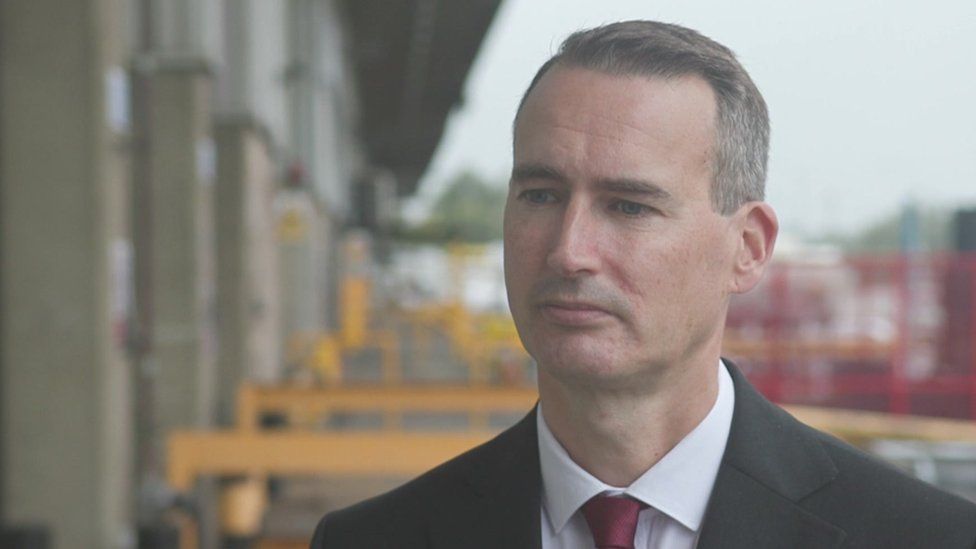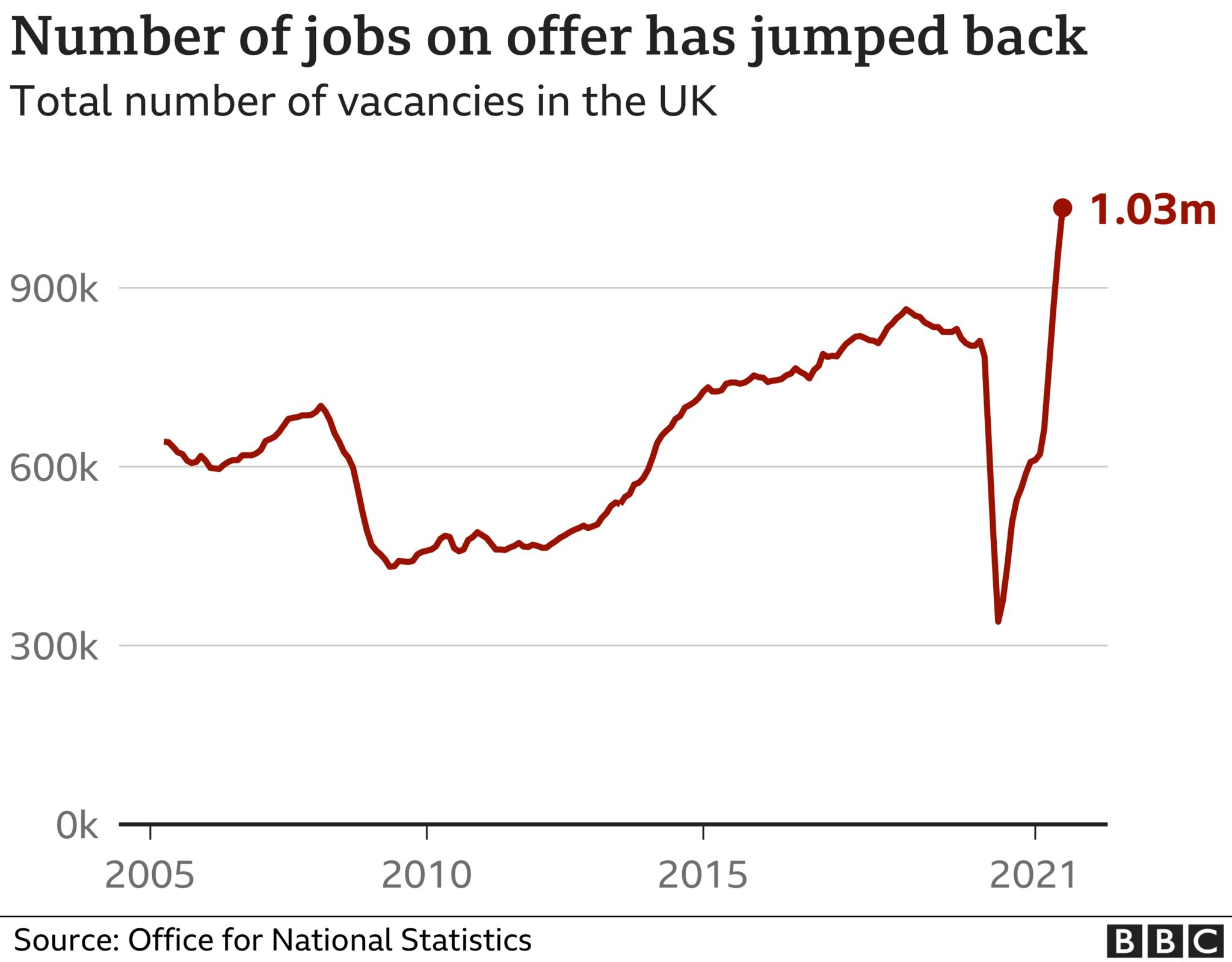The furlough scheme closes on Thursday, with uncertainty ahead for people who have not yet returned to work.
Nearly one million workers were expected to be on the scheme at the end of September, according to estimates by the Office for National Statistics.
It is unclear how many of those still were relying on it for all of their income.
Many forecasters, including the Bank of England, are expecting a small rise in unemployment as the UK scheme ends.
The chancellor said he was “immensely proud” of the near £70bn scheme, but now was the right time to close it, despite calls for further support from some badly-hit companies.
The travel sector has suffered more than most during the pandemic, with businesses being affected by an evolving array of restrictions and dented consumer confidence.
Mark Andrew, the director of Animal Aircare, which helps pets travel overseas via Gatwick Airport, said some of his staff may be made redundant if business does not improve.
The firm has not yet had to lay off staff, which Mr Andrew said was “purely down to furlough”.

“Furlough ending means there’s a real question mark for our business. We’re still waiting for Gatwick to pick up… it seems the airline industry is not buoyant enough yet,” he said.
Although the end of the scheme comes amid a record number of job vacancies, Fidelity International’s investment director, Maike Currie, told the BBC that “no-one really knows what is next” as furlough closes.
“I think what we can be certain of is that we’ll see under-employment, where employees return to work but possibly not on a full-time basis and that they might need to supplement their income.”
Furlough was introduced in March 2020 and helped pay the wages of 11.6 million workers after Covid-19 forced large parts of the UK economy to close.
Officially known as the Coronavirus Job Retention Scheme, it saw the government pay towards the wages of people who could not work, or whose employers could no longer afford to pay them, up to a monthly limit of £2,500.
At first it paid 80% of their usual wage, but in August and September it paid 60%, with employers paying 20%.
According to Citizens Advice, people could work elsewhere while furloughed – if their employment contract allowed.

There have been big recruitment drives for hospitality staff, HGV drivers and warehouse workers as businesses get back on their feet.
According to the latest official figures, the UK’s economy grew by 5.5% between April and June – revised up from the initial estimate of 4.8%.
The uplift was largely driven by household spending surging after lockdowns, although many firms are now being held back by current labour shortages.
Susannah Streeter, senior investment and markets analyst at Hargreaves Lansdown, said: “Any hope that the end of the furlough scheme might be the magic wand to solve the supply chain crisis is likely to be wishful thinking.”
There is likely to be a big mismatch of skills and experience between those leaving the furlough scheme and the jobs on offer, she added.
‘Critical to Covid crisis’
The chief secretary to the Treasury Simon Clarke told the BBC’s Today programme: “We think there are probably two million fewer people unemployed than would have been the case if this scheme hadn’t been introduced.
“I think it’s done an enormous amount to shield our economy and our society from the worst of Covid.”
The scheme has also been praised by the Resolution Foundation, a think-tank that focuses on people with low incomes, as a “great success”.
Its senior economist Dan Tomlinson said furlough had been “as critical to fighting the Covid crisis as nationalising the banks was to fighting the global financial crisis” and helped protect living standards.
But the foundation’s recent research suggested that a small rise in unemployment was a “real risk” for those still on the scheme as it ends, particularly older workers or those in the travel sector.
‘I feel torn’
For many of those who do return to work as the scheme ends, conditions will not be the same as pre-pandemic.
Jess Pitman was furloughed from her job as marketing manager at a travel firm two weeks after the scheme was introduced.
The company she works for specialises in organising trips abroad to raise money for charities. A trek across the Great Wall of China was one of its best-selling products, but travellers cancelled their plans when Covid hit.
The company’s payroll has been reduced from 27 to just five and the 29-year-old will return to work part-time, topping up her income with freelance work.

“I feel really torn about the end of furlough, and I’m really sad for the travel industry as a whole,” Jess said.
“I know a lot of people in the industry will be made redundant because of the end of furlough. I think we’ll lose a lot of talented people, which is really disappointing.”
A spokesperson for the Association of British Travel Agents (Abta) warned that companies in the sector still face “extreme difficulties” because of continued travel restrictions.
Abta called for sector-specific support for smaller firms in particular, who have lost two summers of sales, as well as those which specialise in destinations still subject to red list rules.
“The government needs to look at how it can support these businesses – particularly as the furlough scheme comes to an end – through a package of tailored financial support, including extending business rates relief and a specific grant scheme for travel companies,” the spokesperson added.
Elsewhere, the Federation of Small Businesses (FSB) also cited concerns over a “colder environment” for business.
Employers and workers alike will have to cope with the end of the furlough scheme, as well as the scrapping of an incentive for hiring apprentices, rising energy bills and the planned cut to Universal Credit in October.
Mike Cherry, national chair of the FSB, said: “The removal of some of the support measures brought in to hold off the worst effects of the pandemic on businesses will be tough for many to navigate.”
However, the Treasury said generous support was being provided through its “Plan for Jobs” which it said was part of a £400bn spending package.
Chancellor Rishi Sunak said he was “immensely proud of the furlough scheme, and even more proud of UK workers and businesses whose resolve has seen us through an immensely difficult time”.
Source: BBC

